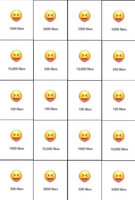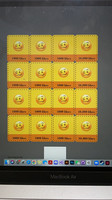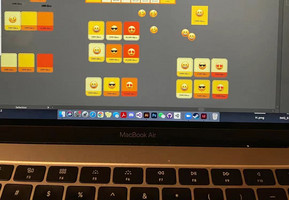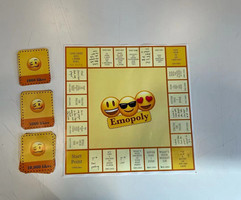Development






Development Process
In the early stages of the game's design, we first drew a lot of inspiration from the board game Monopoly. We made Monopoly a rough idea of the board and a reference to the core mechanics of the game. But in terms of content and form, we wanted to do something very unique. We wanted our game to promote social interaction between players, as well as helping players get to know each other quickly and making friends. From the pictures we uploaded of the design process, you could see that we started out sketching out our board and important game content with a piece of cardboard and a pen. The sketch included some fun little social games, such as the moment of truth and social tasks. Then we carried out some play tests, the specific content can be seen in the reports below. After the play test, we first beautified the appearance of the board and props. This was followed by a number of changes to the rules, as well as improvements in gameplay and innovation. For example, we added some random quests that players could draw cards to challenge. Of course, we also added some big penalties to make the game come to a natural end. In the overall design of the game board, we also used a very warm and lively color scheme, hoping to make players experience a positive and active social atmosphere.
Playtest Report 1
Sept.8th
Description: We’re designing a board game inspired by Monopoly, but having the content of mini social games such as Truth or Dare and Never Had I Ever. The purpose of Emopoly is gathering players together and having some funny socializing interactions with each other. The core mechanic is similar to Monopoly, the content of the game is completely different though. The player who has no Likes cards when the game goes will be considered as “bankrupted” and loses the game.
Group members: Jasmine, Kurt, Emily and Jackson
Main Playtest question: Generally, how’s the game mechanic working? Are the events and missions fun for the players to social and interact with others?
Feedback:
1. The forcing ability might need a special card that the player could keep in hand and use later.
2. The forcing skill can’t work if the player isn’t in a grid with mission.
3. The direction, clockwise or counter.
4. The quality of the “Likes” card.
5. More mini game, maybe some mini game attached with Switch and Steal box. Make more fun interaction when player stealing or switching Likes (they might lose the special ability if they lost the mini game).
6. The failing missions could be more flexible.
7. The color of different amount Likes card could be modified.
8. The missions could be randomly assembled by the players for each round.
Conclusion:
First of all, we got a lot of good feedback from this play test. First and foremost, our games need to have a clearer rule-making. For example, the number of people in the game is limited, and the direction in which the player can play the game on the board. Second, in terms of gameplay, we need something more challenging, such as random tiles, rather than just fixed tasks on the board. Finally, some details need to be improved, such as different values of currency should be represented in different colors so that players can distinguish them more clearly.
Playtest Report 2
Sept 11- 12 th
Main Playtest question: Generally, how’s the game mechanic working? Are the events and missions fun for the players to socialize and interact with others? How do players feel about the “likes” card and tasks needed to complete on the board?
Feedback:
1. Can an action card be used against a chance card? EX: When a player has the ability to stop another player from completing their task and collect likes from them, can they use that ability against another player's ability that steals or switches cards with another player?
2. There should be a specific time limit on certain questions regarding questions like “ what is your biggest lie?” in order to help players navigate through the game.
3. How will the game end? There are problems where a player can easily lose during the first two rolls since there are difficult tasks at the beginning of the game. And players felt like the game would never really end.
4. Someone suggested that maybe the game can have a destination where whichever player reaches to the destination first wins instead of continuously playing.
5. Questions against Chance card and Action card, should there be any chance or action card at all?
6. Emopoly likes card design, maybe it is better to have different emojis and colors that represent different amounts of likes.
7. Someone commented on how likes and followers are on social media compared to how likes are designed in Emopoly. He suggested that maybe we can start off with the player who has the most followers and likes at the starting point and may put those who don’t use social media at a disadvantage.
Conclusion:
Overall, we received a lot of positive feedback on Emopoly expressing that the game was really fun and they will like to play it again if possible. We thought about how Chance/action cards will affect the game play. Then we decided to just keep steals and switch cards on the board and got rid of action cards like having the ability to stop another player from completing a task. But there is a change in design where we are mixing steals and switching cards into two stacks of tasks cards players can randomly pick up during the game to keep it as a surprise. We also redesigned the likes card so it is easier for players to recognize.
It was very interesting as tasks became more challenging. There are players who don’t care as much and complete whatever task is given vs. players who rather lose the game feeling uncomfortable to complete a task. The main purpose of this game is to socialize and talk to each other even if players are random strangers, I think we have successfully reached our goal.

Leave a comment
Log in with itch.io to leave a comment.